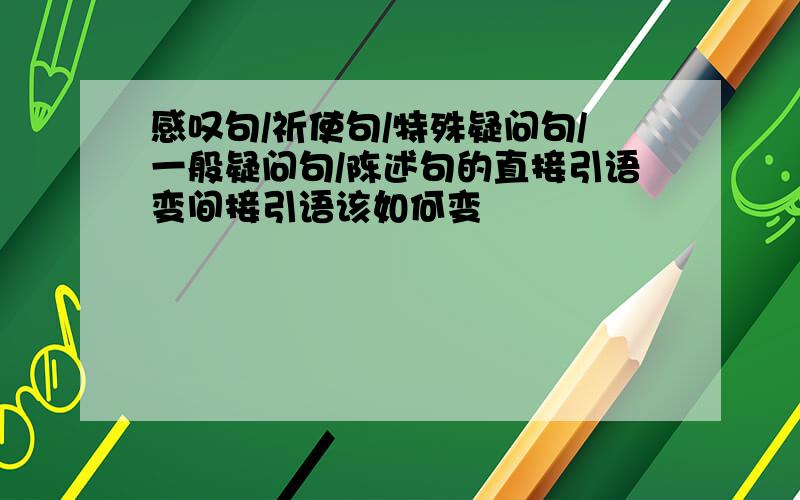感叹句/祈使句/特殊疑问句/一般疑问句/陈述句的直接引语变间接引语该如何变
来源:学生作业帮助网 编辑:作业帮 时间:2024/11/19 01:41:02

感叹句/祈使句/特殊疑问句/一般疑问句/陈述句的直接引语变间接引语该如何变
感叹句/祈使句/特殊疑问句/一般疑问句/陈述句的直接引语变间接引语该如何变
感叹句/祈使句/特殊疑问句/一般疑问句/陈述句的直接引语变间接引语该如何变
1. 直接引语是陈述句时
间接引语为that引导的宾语从句(口语中that可以省略),主句的引述动词主要有say ,tell, repeat, explain, think等.
He said , "You are younger than I."-’He said (that ) I was younger than him.
2.直接引语是疑问句时
间接引语为陈述语序:主句的谓语动词say 改为ask,或改为wonder, do not know, want to know, be not sure, be puzzled等.
(1) 一般疑问句或反意疑问句变为if (whether)引导的宾语从句.
She said, "Do you often come here to read newspapers?"
→She asked me if (或whether)I often went there to read newspapers.
She asked me , "You have seen the film, haven’t you?"
→She asked me whether(或if )I had seen the film.
(2) 选择疑问句变为whether….or 宾语从句.
I asked him, "Will you stay at home or go to a film tonight?"
→I asked him whether he would stay at home or go to a film that night.
(3)特殊疑问句变为由原来的疑问词引导的宾语从句.
He asked , "Where do you live?"
→He asked me where I lived.
3.直接引语是祈使句时
间接引语为不定式,作ask , tell, beg, order, warn, advise等动词的宾语补足语(don’t 变为not ).
The teacher said to the boy, "Open the window."→The teacher told the boy to open the window.
His father said to him , "Don’t leave the door open."→His father told him not to leave the door open.
[注意]
(1) 有些表示建议、提议、劝告或要求的祈使句,可以用suggest ,insist等动词 加以转述.例如:
He said, "Let’s go to the theatre."
→He suggested (our )going to the theatre.或He suggested that we(should) go to the theatre.
(2) "Would you mind opening the window?" he asked.
→He asked me to open the window.
"Why don’t you take a walk after supper?" he asked .
→he advised me to take a walk after supper.
"Shall we listen to the music?" he asked.
→He suggested listening to the music.
4.直接引语是感叹句时
间接引语为what 或how 引导,也可以用that 引导.
She said, "What a lovely day it is !"
→She said what a lovely day it was .或She said that it was a lovely day.